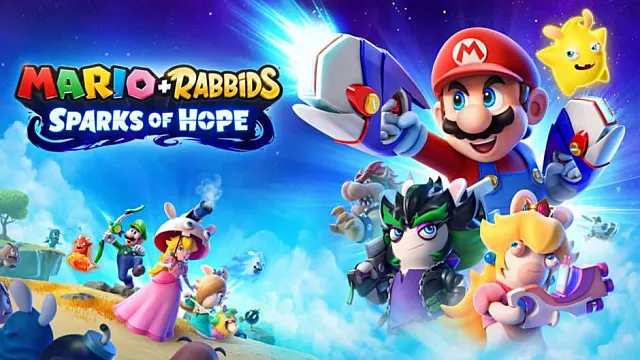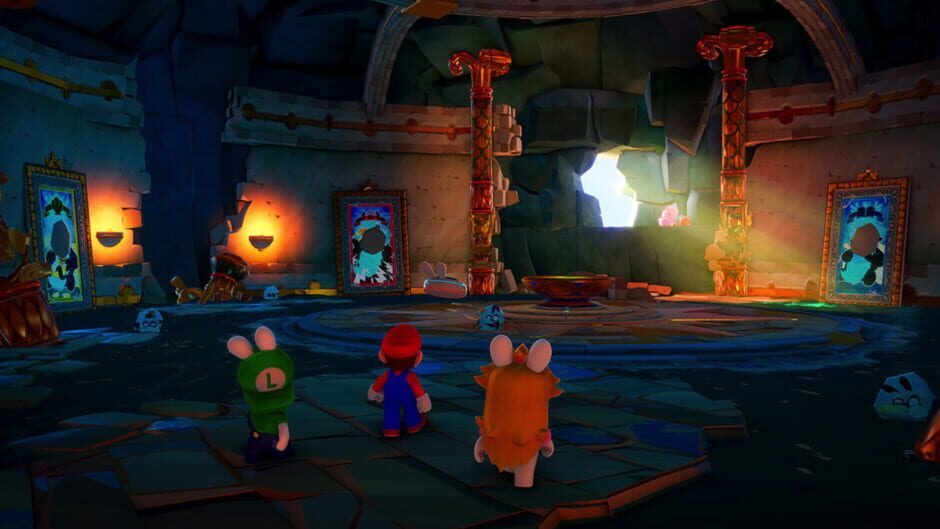Mario + Rabbids Kingdom Battle was one of the first surprise Nintendo Switch hits back in 2017. The tactics RPG was a wonderfully wacky marriage between Rayman‘s Raving Rabbids and the Super Mario universe that was, on top of the already unbelievable mashup, a departure for a company as precious about their characters as Nintendo.
Was it weirder that Kingdom Battle gave Mario and all his friends guns or that the Rabbid counterparts were actually cosplaying the heroes from the Mushroom Kingdom? Both sound absurd on paper, but the weirdest part was that when it all came together, the game was what it set out to be.
Five years later and Mario + Rabbids: Sparks of Hope might be the strangest Mario spinoff yet. It is certainly the trickiest to understand at a glance. Like its predecessor, Sparks of Hope is primarily a tactics game with hints of platforming and environmental puzzles.
These supporting flavors are stronger than hints this time around and even the tactics portions have ditched the grid-based battle system of the first. In terms of both its genre and how it lets you play with its systems, the new Mario + Rabbids is inventive and playful, making it a bold step up from Ubisoft’s first attempt.
The original Mario + Rabbids was easily reducible to “Mario meets XCOM.” Perhaps this was on oversimplification in the first place, but Sparks of Hope does work to dispel any reductive sentiment. The game is still a turn-based, cover-based shooter, but every element of the experience feels retooled for the better this time around.
From the get-go, everything about Sparks of Hope feels looser. The tactical battles no longer operate on a grid system. Instead, characters are free to run around and interact with anything and anyone within their range of motion. This immediately adds a flexibility to every turn that the first game couldn’t accomplish by aping the grid system so tried and true to the genre.
The change pays off, especially as you level up and are allowed to do much more on a given turn. Eventually, Luigi and Mario can move from one side of a map to the other in just one turn using a conjunction of the non-combat abilities Sparks of Hope gives all characters.
The overworlds, too, feel more like playgrounds now. Each is filled with side quests that consist of more battles, but a healthy dose of environmental puzzles and Coin challenges add variety to the mix. And, with some late game exceptions, these puzzly sequences manage to stick around just long enough, not overstaying their welcome.
As should be apparent by now, Mario + Rabbids: Sparks of Hope isn’t afraid to make big changes to the established Mario + Rabbids formula. After retiring for some R&R, Mario and the original game’s cast of heroes (minus Yoshi) are sucked back into a galactic conflict against the evil Cursa, who is allowing Darkmess energy to destroy the universe. It’s after getting this verbose excuse to galaxy hop that you are introduced to the biggest new addition and the game’s namesake — the Sparks.
A specific callback that connects Sparks of Hope to Super Mario Galaxy, the Sparks are fusions of the Lumas from the 2007 game and Rabbids. Each Spark has a unique passive and active ability. Many apply elemental effects to weapons and increase elemental resistances, but some let you buff your teammates, and eventually, you unlock Sparks that allow you to Summon allies.
Each of the nine heroes you eventually unlock has two Spark slots. Sparks level independently from the heroes and can be equipped and moved from character to character at any time — a lot like Materia, for you Final Fantasy VII fans. Star Bits, another connection to Mario Galaxy, are in used to level your Sparks.
In short, the Spark system is a wonderful and much-needed addition that keeps the Mario + Rabbids sequel fresh for nearly its entire 30+ hour runtime. Each world you travel to has a bounty of side quests — this is a Ubisoft game, after all — that will earn you currency to spend on items that will quickly upgrade your Sparks. This loop repeats for each of the five overworlds you explore, and while the structure is formulaic, the gameplay only gets better as you only more abilities for your heroes.
The first half of Sparks of Hope isn’t without its issues. Difficulty levels seem to arbitrarily spike in a handful of the boss fights and other major encounters. This forces you to grind on the side content, which shouldn’t be an issue for anyone already completing the most content they can. Just know you will have to engage with a good deal of side content to reach the recommended level cap by the time the final boss rolls around.
As you near the game’s end, though, it can get easy to feel unstoppable in regular encounters, so the late-game challenges that do arise are welcome.
Throughout the entirety of Mario + Rabbids: Sparks of Hope, I found myself cycling between characters. For almost everyone I found a unique, versatile build. Mario can be a damage-dealing traversal machine, stomping on heads and dashing through Goombas left and right. New character Edge gets a dash that increases her range of movement on every successful hit.
Chaining these free movement damage bonuses together with each character’s Sparks and Skills makes for increasingly dynamic and rewarding turns. In these moments, Sparks of Hope shines as an excellent genre-twisted mashup of platforming and strategy.
The only place where Sparks of Hope fails to match the creativity of the first game is in its storytelling. Not that the writing in Kingdom Battle is especially memorable, but that game has moments of self-awareness that poke fun at the Mario franchise that feel absent in Sparks of Hope. The only fully-voiced characters are your robot companions, including the return of Beep-O, your robot guide who tended to get on my nerves whenever I wasn’t skipping through the dialogue.
At best, the writing in Mario + Rabbids: Sparks of Hope is inoffensive, but at its worst, the humor can be grating for adults. Which is a shame, considering how mature the rest of the decisions in the sequel feel.
Mario + Rabbids: Sparks of Hope Review — The Bottom Line
Pros
- A refined mix of turn-based tactics and Mario-inspired platforming.
- Sparks add a whole new layer of customization and player expressivity.
- Heroes are balanced and each worth using and leveling.
Cons
- Supporting characters are awfully annoying.
- Random difficulty spikes can be frustrating.
Both a great entry point and a refreshing departure for fans of the genre, the sequel to Mario + Rabbids: Kingdom Battle adds an approachable flexibility to the first game’s formula. This creative approach to the tactics genre finally gives the series an identity of its own. It won’t be winning any awards for its writing, but Sparks of Hope still manages to be a blast at nearly every turn.
Merging tactics, RPG elements, and platforming, the Mario + Rabbids: Sparks of Hope is one of the best Mario spin-offs on the Switch.
[Note: Ubisoft provided the copy of Mario+Rabbids: Sparks of Hope used for this review.]









Published: Oct 30, 2022 04:47 pm